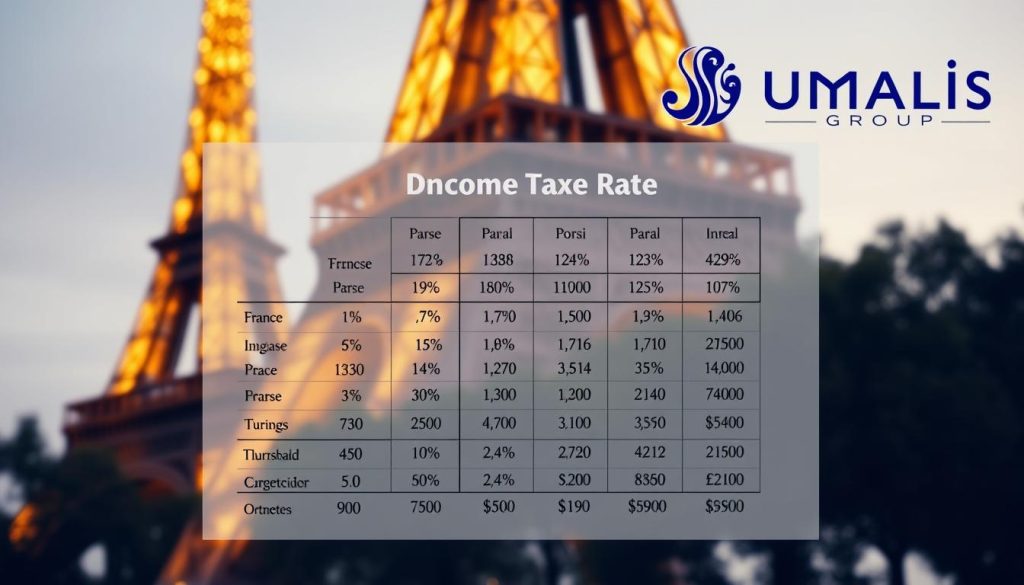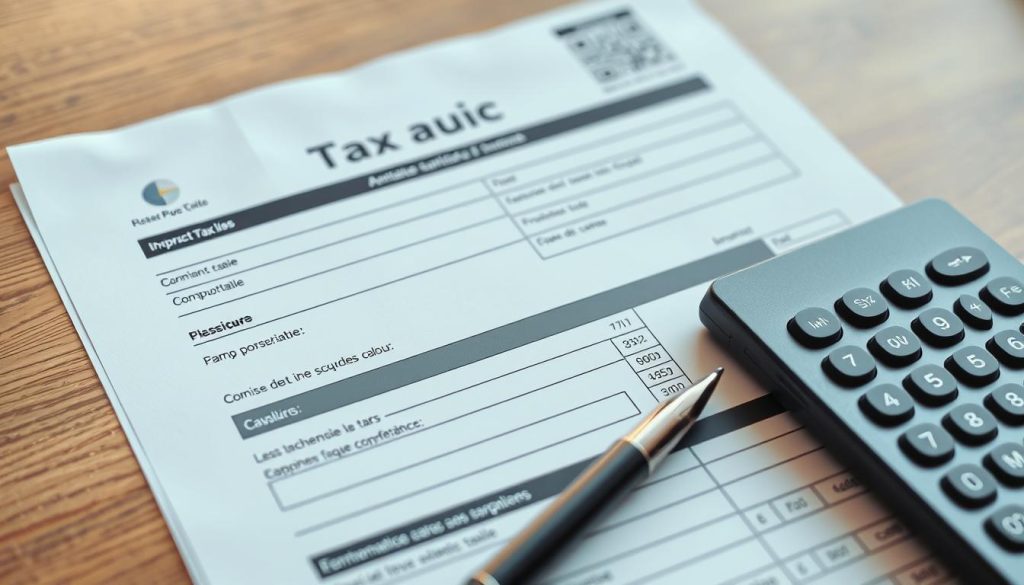As an independent professional in France, navigating the complex landscape of tax obligations can be daunting. Ensuring compliance while optimizing financial outcomes requires a deep understanding of the French tax system.
You’re not alone in this challenge. Many independent professionals face similar difficulties in managing their taxable income and ensuring they meet all necessary tax residency requirements.
Understanding the intricacies of the French tax system is crucial for efficient financial management. This comprehensive guide will explore the various tax implications you must consider, from income tax obligations to social security contributions, and provide insights into strategic planning for wealth management and estate planning.
Table of Contents
Key Takeaways
- Understand the French tax system’s unique features and how they impact your business.
- Learn how to optimize your tax position while remaining compliant with French regulations.
- Discover the importance of tax planning in your overall business strategy.
- Explore how different business structures affect your tax liabilities.
- Get insights into strategic wealth management and estate planning.
Understanding the French Tax System for Independent Professionals
Understanding the French tax system is crucial for independent professionals to manage their finances effectively. As an independent professional, you are required to comply with various tax regulations, including filing tax returns and making timely payments.
Tax Residency Status and Its Impact
Your tax residency status in France significantly impacts your tax obligations. If you are considered a tax resident, you are subject to income tax on your worldwide income. The French tax authorities consider you a resident if you have your primary residence in France, or if you spend more than 183 days in France during a calendar year. Understanding your tax residency status is essential to determine the scope of your tax liabilities.
Overview of Tax Filing Obligations
Independent professionals in France must file both personal and professional tax returns. Your personal income tax return is typically due in May or June of the following year, while your professional tax return for BIC or BNC activities usually follows the same deadline. Additionally, you must file VAT returns on a monthly or quarterly basis, depending on your turnover. Accurate record-keeping is vital to meet these filing obligations.
Key Deadlines for French Tax Compliance
Several key deadlines are critical for independent professionals to be aware of to avoid penalties. The CFE business property tax is due by December 15th each year. Social security contributions are calculated based on the previous year’s income, with adjustments made once the actual income is determined. Tax payment deadlines vary depending on the chosen payment method, with direct debit offering more flexibility. Effective calendar management is essential to meet these deadlines and avoid interest charges.
To manage your tax obligations effectively, it is crucial to stay informed about the various deadlines and filing requirements. By doing so, you can minimize potential penalties and ensure compliance with the French tax system.
Income Tax Rates and Brackets in France

France’s income tax system is progressive, meaning that the tax rate increases as the taxable income increases, which is essential for independent professionals to understand. This progressive structure is designed to distribute the tax burden more evenly across different income levels.
Progressive Tax Rate Structure
The French income tax system is characterized by a progressive tax rate structure, with multiple tax brackets. As your annual income increases, the tax rate applicable to your income also increases. This means that higher-income earners are taxed at a higher rate compared to lower-income earners.
The progressive tax rate structure is divided into several brackets, each with its corresponding tax rate. For instance, lower-income brackets are taxed at a lower rate, while higher-income brackets are taxed at a higher rate. Understanding these brackets is crucial for independent professionals to manage their tax liability effectively.
Family Quotient System
France’s tax system incorporates a « Family Quotient » mechanism, which takes into account the number of dependents in a household when calculating taxable income. This system aims to reduce the tax burden on larger families by adjusting the taxable income based on the number of family members.
By applying the Family Quotient, families with more dependents benefit from a lower effective tax rate, as their taxable income is adjusted downward. This mechanism is particularly beneficial for independent professionals with larger families, as it helps reduce their overall tax liability.
Calculating Your Effective Tax Rate
Your effective tax rate represents the percentage of your total taxable income that you actually pay in taxes. To calculate your effective tax rate, you need to divide your total tax liability by your total taxable income.
- Understanding your effective tax rate helps in comparing different business structures and investment opportunities on an after-tax basis.
- Various deductions, credits, and the Family Quotient system all contribute to lowering your effective tax rate below what the marginal rates might suggest.
- Tracking your effective tax rate over time can help you evaluate the success of your tax planning strategies and identify areas for improvement.
As stated by tax experts, « Your effective tax rate is a more accurate representation of your tax burden than your marginal tax rate. » This is because the effective tax rate takes into account all the deductions and credits available, providing a clearer picture of your overall tax liability.
French Social Security Contributions for Self-Employed

Social security contributions in France are designed to provide comprehensive coverage for self-employed individuals. As an independent professional, understanding your obligations and benefits within the French social security system is essential for managing your career effectively.
Mandatory Contribution Categories
The French social security system for self-employed professionals includes several mandatory contribution categories. These contributions are crucial for accessing various social benefits.
- Retirement pension contributions
- Healthcare and disability insurance
- Family benefits contributions
- Daily allowances for illness or maternity/paternity leave
Each of these categories plays a vital role in ensuring that self-employed professionals have a safety net during different stages of their lives and careers.
Calculation Methods and Rates
The calculation of social security contributions for self-employed individuals in France is based on their income. The rates can vary depending on the type of contribution and the professional’s income level.
Key factors influencing contribution rates include:
- The nature of your professional activity
- Your income level
- The specific social security regime you are affiliated with
Understanding these factors can help you better anticipate your financial obligations.
Benefits Covered by Your Contributions
Your social security contributions provide access to a wide range of benefits, including:
- Healthcare benefits, covering medical consultations, hospitalizations, and prescriptions
- Retirement benefits, including a basic state pension and complementary pension
- Family benefits, such as birth allowances and family allowances
- Daily allowances during illness or maternity/paternity leave
- Disability coverage in case of partial or total inability to work
By contributing to the French social security system, self-employed professionals can ensure they have comprehensive coverage, allowing them to focus on their work with greater peace of mind.
Business Structure and Tax Implications
As an independent professional in France, selecting the appropriate business structure can significantly impact your tax obligations and benefits. The choice of business structure is a critical decision that affects not only your legal liabilities but also your taxable income and overall financial planning.
Sole Proprietorship vs. Limited Company
When deciding between a sole proprietorship and a limited company, it’s essential to consider the tax implications of each. A sole proprietorship is straightforward and involves reporting your business income directly on your personal tax return. On the other hand, a limited company is taxed separately, potentially offering lower tax rates on retained profits.
- The EURL/SARL structure is taxed under corporate tax (IS), allowing for retention of profits within the company at a lower corporate tax rate, deferring personal taxation until distribution.
- SAS/SASU structures offer flexibility in governance and can optimize the balance between salary and dividends, impacting your overall tax liability.
Tax Advantages of Different Business Structures
Different business structures offer various tax advantages. For instance, the micro-entrepreneur status provides a simplified accounting and a flat-rate tax and social contribution system, beneficial for professionals with low expenses relative to turnover. Additionally, liberal professions can benefit from specific structures like SEL (Société d’Exercice Libéral) that combine liability protection with tax optimization opportunities.
- Holding company structures can create additional tax planning opportunities for professionals with multiple activities or significant investments.
- Tax credits and incentives may be more accessible under certain business structures, particularly for innovative activities or those in specific geographic zones.
By understanding the tax implications of different business structures, independent professionals in France can make informed decisions that minimize their tax liability and maximize their financial stability.
Capital Gains Tax for Independent Professionals
Navigating the complexities of capital gains tax is essential for independent professionals to optimize their tax strategy. Capital gains tax applies to the sale of various assets, including business assets, securities, and real estate.
Taxation of Business Asset Sales
When independent professionals sell business assets, the gains are subject to capital gains tax. The tax rate depends on the type of asset and the holding period. Business assets include equipment, vehicles, and other property used in the professional activity. The taxable gain is calculated by subtracting the acquisition cost and any improvement expenses from the sale price.
Securities and Investment Income
Independent professionals often hold securities or investments as part of their financial portfolio. The sale of these securities is subject to capital gains tax, with the tax rate varying based on the holding period and type of security. Long-term capital gains are generally taxed at a lower rate than short-term gains.
Real Estate Capital Gains
Real estate capital gains are subject to a specific tax regime. The total tax rate can be as high as 36.2%, including both income tax and social charges. However, a system of taper relief reduces the taxable gain based on the holding period, with complete exemption from income tax after 22 years and from social charges after 30 years.
| Holding Period | Income Tax Rate | Social Charges Rate | Total Tax Rate |
|---|---|---|---|
| Less than 2 years | 19% | 17.2% | 36.2% |
| 2-22 years | Taper relief applies | 17.2% | Varies |
| After 22 years | 0% | 17.2% | 17.2% |
| After 30 years | 0% | 0% | 0% |
Strategic timing of real estate sales can significantly reduce the resulting tax liability. It’s also important to note that principal residences are exempt from capital gains tax, making property classification crucial for professionals working from home.
Wealth Tax Considerations for High-Earning Professionals

High-earning professionals must navigate complex wealth tax regulations to optimize their financial positions. As an independent professional, understanding the nuances of wealth tax is crucial for effective financial planning.
Impôt sur la Fortune Immobilière (IFI) Explained
The Impôt sur la Fortune Immobilière (IFI) is a tax on real estate wealth. It applies to the net taxable value of real estate assets held on January 1st of each year. To manage your IFI liability, it’s essential to understand what constitutes taxable real estate and how to value these assets accurately.
- Strategic debt structuring can reduce your net taxable base for IFI purposes.
- Investing in exempt assets like forests or qualifying business real estate can shift your wealth into non-taxable categories.
Strategies to Manage Wealth Tax Liability
Effective management of wealth tax liability involves several strategies. Proper valuation of real estate assets is crucial, as declared values are used unless challenged by tax authorities. Restructuring property ownership between family members can distribute the tax burden and potentially benefit from multiple tax-free thresholds.
- Timing property acquisitions and disposals around the January 1st assessment date can impact your wealth tax position.
- For international professionals, careful consideration of tax residency status is important, as non-residents are only taxed on French properties.
- Regular review of your real estate portfolio ensures your wealth tax strategy remains optimized.
Tax Deductions and Credits Available to Independent Professionals

As an independent professional in France, understanding the available tax deductions is crucial for optimizing your financial situation. The French tax system provides various deductions that can significantly reduce your taxable income, thereby lowering your overall tax liability.
Business Expense Deductions
One of the primary ways to reduce your taxable income is by deducting legitimate business expenses. This includes costs directly related to your professional activities, such as office supplies, travel expenses, and equipment purchases. Ensuring you keep detailed records of these expenses is vital for claiming them on your tax return.
- Office supplies and equipment
- Travel expenses related to business
- Professional fees and services
Home Office and Vehicle Expenses
Independent professionals can also deduct a portion of their home expenses if they use a dedicated space for their business. Similarly, vehicle expenses can be deducted if used for professional purposes. It’s essential to maintain accurate records to support these deductions.
- Home office rent or mortgage interest
- Utilities and maintenance costs
- Fuel and maintenance for business use of vehicles
Professional Development and Insurance Deductions
Investing in your professional development and insurance can also yield tax benefits. Expenses for continuing education, professional certifications, and certain insurance premiums are deductible.
- Continuing education and certification costs
- Professional liability insurance premiums
- Other business-related insurance premiums
By leveraging these deductions, independent professionals can significantly reduce their taxable income. It’s advisable to consult with a tax professional to ensure you’re taking full advantage of the deductions available to you.
Estate Planning and Inheritance Tax Strategies
Estate planning is a vital aspect of financial management for independent professionals in France, offering a way to minimize inheritance tax liabilities and ensure that your family is protected. As an independent professional, it’s essential to consider the implications of French inheritance tax on your estate and explore strategies to optimize the distribution of your assets.
French Inheritance Tax Framework
The French inheritance tax framework is complex, with tax rates varying depending on the relationship between the deceased and the beneficiary, as well as the amount inherited. Understanding these rules is crucial for effective estate planning. In France, direct descendants and ascendants benefit from more favorable tax treatment, with allowances and rates that can significantly reduce the tax burden on your children.
- The allowance for children is €100,000, reducing the taxable amount.
- Tax rates range from 5% to 45%, depending on the amount inherited and the beneficiary’s relationship to the deceased.
Using Assurance-Vie for Tax-Efficient Estate Planning
Assurance-vie, or life insurance contracts, are powerful tools in French estate planning, offering significant inheritance tax advantages. By utilizing assurance-vie contracts, independent professionals can bypass certain inheritance tax rules and ensure that their beneficiaries receive a larger share of their estate.
- Premiums paid before age 70 benefit from a tax-free allowance of €152,500 per beneficiary.
- Amounts between €152,500 and €852,500 are taxed at 20%, and amounts beyond €852,500 are taxed at 31.25%.
- Assurance-vie contracts allow for flexible beneficiary designations, which can be modified as family circumstances change.
By combining assurance-vie with other estate planning strategies, independent professionals can create a comprehensive plan tailored to their specific family and asset situation, ensuring that their estate is distributed according to their wishes while minimizing tax liabilities.
International Tax Considerations for Mobile Professionals
As a mobile professional, understanding international tax considerations is crucial for managing your tax obligations effectively. When working across borders, it’s essential to navigate the complexities of international taxation to avoid double taxation and ensure compliance with relevant tax laws.
Double Taxation Treaties
France has established double taxation treaties with numerous countries to prevent taxing the same income in both France and the other country. These treaties help in determining tax residency and the allocation of taxing rights between countries. For instance, if you’re a French tax resident earning income from another country, these treaties can help you avoid being taxed on the same income in both jurisdictions.
The treaties typically cover various types of income, including employment income, business profits, and investment income. Understanding the specifics of these treaties is vital for mobile professionals to manage their tax liability effectively.
Exit Tax When Leaving France
France imposes an « exit tax » on unrealized capital gains when tax residents with substantial shareholdings transfer their tax residency outside of France. This tax applies to individuals who have been French tax residents for at least six of the ten years preceding their departure and hold securities exceeding certain thresholds.
- The exit tax targets unrealized capital gains on shares, securities, and certain financial instruments valued at the time of departure.
- Payment deferral is automatically granted when moving to an EU country or a country with appropriate tax cooperation agreements with France.
- Professional planning before changing tax residency can potentially mitigate exit tax consequences through strategic timing or restructuring.
It’s crucial for mobile professionals to seek professional advice to navigate these complex rules and ensure compliance with French tax regulations.
Conclusion: Building a Comprehensive Tax Strategy
Developing a comprehensive tax strategy requires a deep understanding of how different aspects of the French tax system interact and impact your overall financial situation. As an independent professional, effective tax planning must balance immediate tax optimization with long-term financial goals and compliance requirements.
To achieve this balance, it’s essential to regularly review and adjust your tax strategy as your business evolves, your personal circumstances change, and tax laws are modified. Working with qualified tax professionals who understand both the technical aspects of taxation and the specific challenges of independent professionals provides valuable guidance.
Key elements of a successful tax strategy include:
- Maintaining systematic documentation and record-keeping throughout the year to support both tax compliance and effective planning.
- Integrating tax planning with broader financial planning, including retirement preparation, investment strategy, and estate planning.
- Building tax awareness into your business decision-making processes to avoid unexpected tax consequences and maximize after-tax returns on your professional activities.
By adopting a well-designed tax strategy, independent professionals can not only reduce their tax liability but also gain peace of mind, allowing them to focus on their core professional activities with confidence in their tax compliance. This comprehensive approach to tax planning is crucial for achieving long-term financial stability and success.
FAQ
What is my tax residency status, and how does it impact my tax obligations in France?
Your tax residency status is determined by your presence in France. If you spend more than 183 days in France within a 12-month period, you’re considered a tax resident. This status affects your worldwide income taxation in France.
How do I report my income and file my tax return in France?
As an independent professional, you’ll report your income on your tax return, using the relevant forms and schedules. You may need to file additional forms, such as the 2035 form for business income. Consult a tax professional to ensure accurate reporting.
What is the progressive income tax rate structure in France, and how does it apply to me?
France has a progressive income tax system, with rates ranging from 0% to 45%. Your taxable income is divided into brackets, with each bracket taxed at a corresponding rate. The family quotient system may also apply, adjusting your taxable income based on your family situation.
How are capital gains derived from the sale of business assets or real estate taxed in France?
Capital gains are taxed at a rate of 12.8% for long-term gains, plus social security contributions. Certain conditions and holding periods may apply to qualify for this rate. Consult a tax advisor to optimize your capital gains tax treatment.
What are the mandatory social security contributions for self-employed professionals in France?
As a self-employed professional, you’ll need to contribute to the French social security system, covering benefits such as health insurance, retirement, and disability. Contribution rates vary depending on your income and profession.
Can I deduct business expenses from my taxable income in France?
Yes, you can deduct legitimate business expenses from your taxable income. Keep accurate records of your expenses, including receipts and invoices, to support your deductions. Common deductible expenses include home office costs, travel expenses, and professional fees.
How does the Impôt sur la Fortune Immobilière (IFI) wealth tax apply to my real estate holdings in France?
The IFI wealth tax is levied on real estate assets valued above a certain threshold. You may be subject to IFI if your real estate holdings exceed this threshold. Consult a tax professional to understand your IFI obligations and potential exemptions.
What are the tax implications of holding assets outside of France as a tax resident?
As a French tax resident, you’re subject to taxation on your worldwide income, including assets held outside France. You may need to report foreign assets and income on your tax return, potentially impacting your tax liability.





